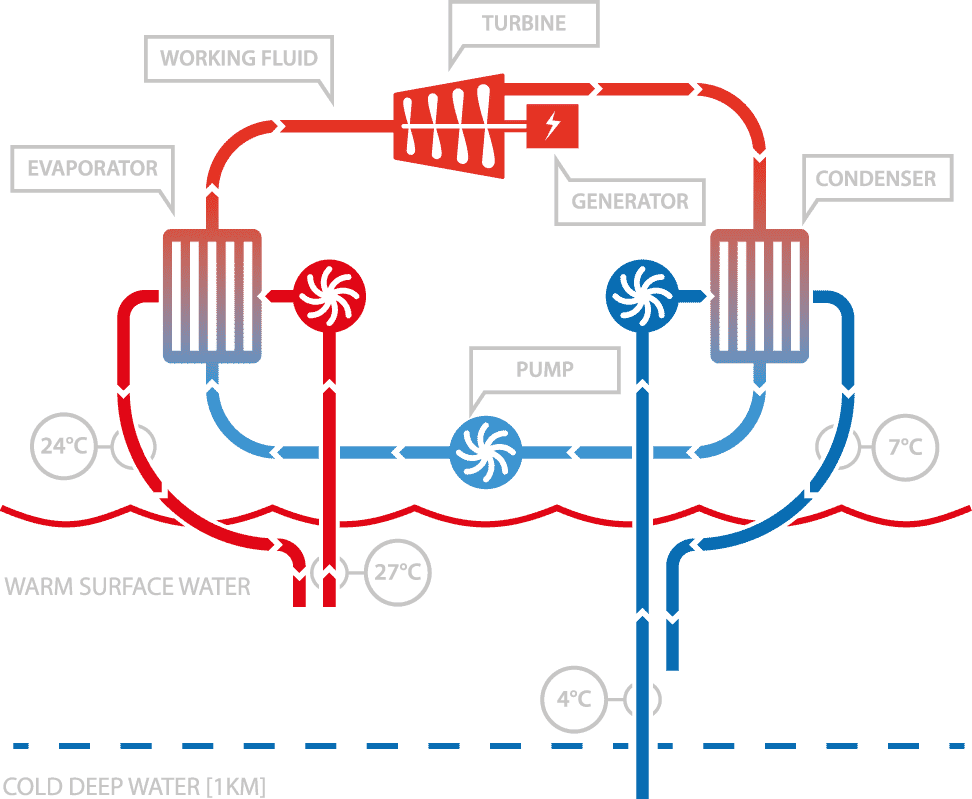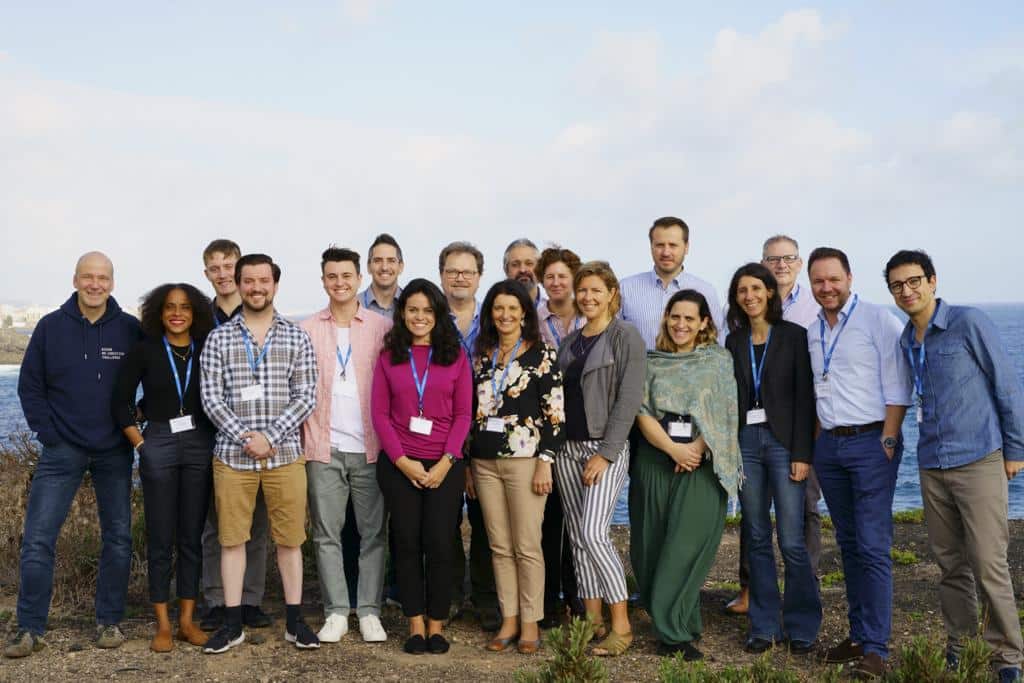1 December 2023 — Experts from industry and research institutions have launched ‘PLOTEC’, a consortium that aims to design an Ocean Thermal Energy Conversion (OTEC) system capable of surviving extreme environmental conditions. This cooperation connects seven organisations across Austria, Italy, Portugal, Spain and the United Kingdom, with specialisms in OTEC, marine renewable energies, research and infrastructure, plastic composites engineering, renewable materials, policy, economics and environmental aspects and computational modelling tools. The project is an essential step for the world’s adoption of sustainable ocean energy technologies, initially in Small Island Developing States (SIDS) and the EU’s Overseas Countries and Territories in tropical regions.
The overall objective of the project is to design and simulate an OTEC platform capable of withstanding the extreme weather effects of tropical oceans, with a viable cost model, validated by a scaled demonstration of a structure. By doing so, key technical and economic barriers to mass OTEC deployment can be overcome. These developments in offshore design, improved materials and computational modelling may also be transferable to other offshore industries where affordable, reliable power is required, such as green ammonia production or aquaculture. The consortium will undertake a series of computer simulations concluding with a physical deployment at the PLOCAN test facility in Gran Canaria in 2024.
PLOTEC is funded by the EU’s key funding programme for research and innovation, Horizon Europe, and UK Research and Innovation (UKRI) in the amount of € 3.5 million. The project will demonstrate pan-European leadership in sustainable, and competitive energy solutions, through the novel utilisation of materials, new designs for OTEC, and advanced modelling technologies demonstrating efficiency gains through a drop in Levelised Cost of Energy (LCOE). The project will also engage with SIDS leaders and policy-makers to set foundations for future capacity-building.
“Our civilisation faces an existential challenge to maintain the sustainable environmental conditions that enable our development and evolution. The commercial development of technologies for the sustainable use of marine resources is an imperative need and also an opportunity to promote a green revolution that we must accelerate with projects like PLOTEC, which not only contributes to preserving habitable conditions for our planet but also to creating new products, services, employment and business models at a local level”, says José Joaquín Hernández Brito, PLOCAN CEO.
“50 million island people across the tropics are depending on us to build appropriate solutions which can provide clean, affordable, baseload power within the range of circumstances they experience. To effectively scale OTEC in line with our ambitions, we must develop a credible track record in operating and surviving in tropical storm zones,” says Dan Grech, Global OTEC Founder and CEO.
PLOTEC partners:
Global OTEC (UK) is accelerating the commercialisation of floating OTEC technology to develop zero-carbon, baseload energy sources that achieve maximum impact in delivering energy security and climate resilience across SIDS and coastal Least Developing Countries (LDCs), in addition to reducing the planet’s greenhouse gas emissions.
Cleantech Engineering Limited (UK) is an engineering design consultancy operating in the arena of renewable energy. The company specialises in the design of offshore floating marine structures, mooring systems and power cable riser systems. It designs and analyses assets across a range of marine energy sectors.
WavEC Offshore Renewables (Portugal) is a non-profit private association dedicated to the development and promotion of marine renewable energies and corresponding supporting technologies. WavEC acts as an intermediary organization between science and industry, bringing together an extensive network of partners and customers.
The Oceanic Platform of the Canary Islands PLOCAN (Spain) is a multipurpose technical-scientific service infrastructure that supplies research, technological development and innovation support development and innovation in the marine and maritime sectors, available to public and private users. PLOCAN offers both onshore and offshore experimental facilities and laboratories, operational throughout the entire year thanks to the Canary Islands’ excellent climatic conditions.
Quality Culture (Italy) is a training provider focused on training programmes both for formal and non-formal education, designed to empower people, with a focus on disadvantaged target groups. Furthermore, Quality Culture provides support and expertise in all phases of project management, from the proposal’s writing to the project’s coordination and implementation.
Agru Kunststofftechnik Gesellschaft m.b.H. (Austria) is the world`s most important single-source supplier of high-quality products made from engineering plastics. They are also the world’s largest HDPE piping manufacturer bringing important stakeholder knowledge to the final detailed design & facilities to construct the CWP (Cold Water Pipe).
University of Plymouth School of Engineering, Computing and Mathematics (UK) is a community of over 100 staff and 150 doctoral and post-doctoral researchers, alongside world-leading facilities, providing a vibrant environment to engage with a wide range of academic, industrial and commercial partners. The school is home to an extensive research portfolio from Offshore Renewable Energy, coastal engineering and advanced materials.
OTEC harnesses the power of the ocean to provide a continuous, cost-effective supply of clean energy. It possesses significant environmental advantages over fossil fuels and nuclear power; requires less land than renewable energy technologies such as solar, wind, biomass and hydroelectric power; and has the potential to produce far more useful and affordable energy than could be generated from other renewable sources.
How does it work?

1. The barge draws in warm surface seawater (of around 26°C) which has been heated by the sun’s rays
2. This warm water is used to evaporate a working fluid with a low boiling point
3. This produces a vapour which spins a turbine to produce electricity using a generator
4. At the same time, cold deep water (of around 4°C) is drawn up through a pipe from the depths of the ocean
5. The cold water cools the vapour, turning it back into a liquid which can then be immediately reused
6. The cycle runs continuously whilst the power generated is transmitted to the grid using a sub-sea cable.

